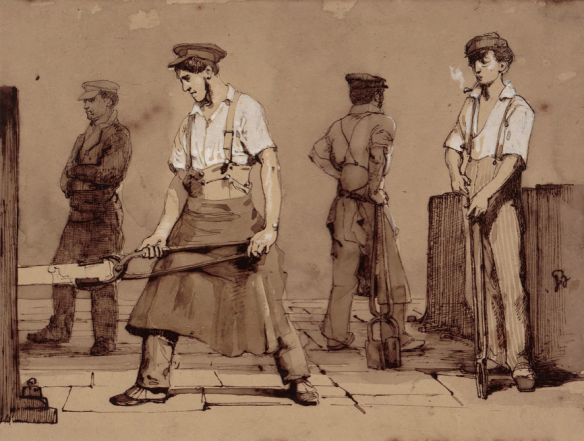A couple of you mentioned being interested in reading Marx. I’m going to see how best to fit this material into our syllabus, but for those of you who are extra-curious, here are some links to relevant material:
First of all, there are a number of different entryways into Marx’s thought-world; most undergraduates will have read The Communist Manifesto (1848) at some point in their humanities training – if you’ve not yet looked at it, I encourage you to do so (link below). Co-written with Marx’s collaborator, Friedrich Engels, the manifesto was published during a wave of revolutions that resonated across Europe, marking the birth of modern class warfare as we now understand it. In France, the revolution pitted workers against the forces of order (police, army, national guard, backed by representatives of property-owning class, the bourgeoisie) in deadly barricade fighting throughout Paris – a battle which the workers ultimately lost. Although The Communist Manifesto didn’t contribute directly to the events of 1848, it was quickly seized as a rallying-cry for revolutionaries around the world. In the wake of the counter-revolution in Germany, Marx and Engels were forced to flee to England, where they spent the following decades writing Capital, a multi-volume analysis of the capitalist system.
Although Marx is primarily remembered for his politics, his economic research is the bedrock of his thinking, and should be the starting-place for any serious investigation of Marx and/or Marxism. Overturning the prevailing wisdom, which attributed economic inequality (i.e. poverty, unemployment, housing shortages, etc.) to malfunctions of the capitalist system, Marx and Engels argued that inequality was the inevitable result of the accumulation of capital: focusing on the industrial sector, they showed that the exploitation of the workforce – specifically, the gap between workers’ pay (which is denominated according to the supply and demand for labor) and the actual value of that labor when employed in production – was, and remains, the source of all profits. If workers were paid the full value of their work, then capitalism would simply collapse; this disparity, or “surplus-value” as Marx and Engels call it, is the key to the economy as a whole, and cannot simply be repaired through better management or more stringent economic regulation.
These are complicated arguments, and they deserve to be studied in detail. For an excellent guide to volume one of Capital, I recommend this online lecture series by David Harvey, a Marxist geographer who currently teaches at the Graduate Center of the City University of New York (CUNY): http://davidharvey.org/reading-capital/
Of course, the genuine article is Capital itself. For our purposes, it might be useful to begin in the middle of the book, with the long chapter titled “Machinery and Modern Industry.” For one thing, this section offers a fascinating history of the rise of factory production and various resistance movements (e.g. the English machine-breakers); it also helps to concretize the various theoretical claims made elsewhere in the book, so that when Marx tells us about “surplus-value” and “primitive accumulation,” we have specific historical examples at the ready. Here’s a link to this chapter: http://www.marxists.org/archive/marx/works/1867-c1/ch15.htm
And a link to The Communist Manifesto: http://www.marxists.org/archive/marx/works/1848/communist-manifesto/
I would be happy to discuss these texts outside of class with any students who are interested.
